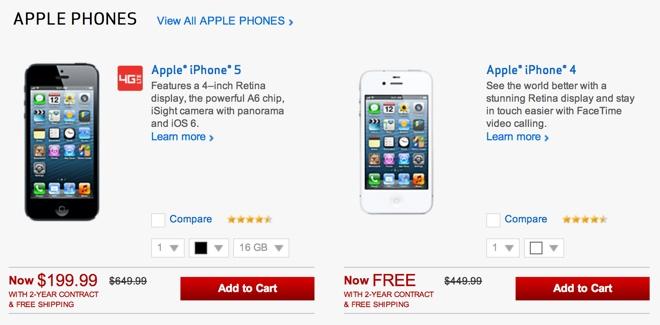Verizon has sold more than 10 million iPhones over the last several months, but a new report finds that the nation's largest carrier could still wind up owing Apple billions of dollars for failing to meet expectations.
Apple's iPhone has been selling more slowly than expected, thanks to the high-end smartphone market becoming somewhat saturated. A report from Moffett Research looked at the numbers and estimated that Verizon might wind up owing Apple up to $14 billion if it doesn't effectively double its iPhone sales from last year, according to the LA Times.
In 2010, Verizon reportedly agreed to $45 billion in purchase agreements through the end of this year. By Moffett's estimate, most of that money is due to Apple since Apple is one of the only manufacturers with the sway to require a purchase commitment of this fashion.
“It is likely that Apple would be reluctant to simply ignore these commitments, since many other carriers around the world are probably in a similar situation, and a simple amnesty would set an unwanted precedent,†the report reads. “It is therefore unrealistic to think that Apple won’t extract some consideration for renegotiating these shortfalls.â€
In the fourth quarter of 2012 and the first quarter of 2013, Verizon shifted more than 10 million iPhone units, with many of those being the more expensive iPhone 5. In order to meet its estimated sales commitment to Apple, Verizon would have to sell $23.5 billion worth of iPhones in 2013, or twice its 2012 iPhone sales.
Representatives from both Verizon and Apple have declined to comment on the Moffett report's contentions.
 Kevin Bostic
Kevin Bostic








 Christine McKee
Christine McKee
 Marko Zivkovic
Marko Zivkovic
 Mike Wuerthele
Mike Wuerthele

 Amber Neely
Amber Neely
 Sponsored Content
Sponsored Content
 Wesley Hilliard
Wesley Hilliard










93 Comments
Oh, I hope not. The fair thing to do would be to allow an extension. It certainly would not be publicly nor commercially in Apple's favour to be persistent in its demands.
I suspect Moffett's analysis is simply faulty. We don't know what the Apple-Verizon agreement actually says, but I seriously doubt there's a scenario where VZ is writing a multi-billion dollar check to Apple for iPhones not ordered. There agreement almost certainly specifies what the effect of not meeting sales goals are that are less draconian (or Verizon would have been insane to agree to the deal).
Easy solution. The new iPhone comes out this fall so Verizon could order more of those devices to make up any shortfall this year and sell them into next year.
Unless Verizon has also committed to selling the same amount next year.
So that adds up to about what 20 million iPhones? Does that come off of the shipped or sold numbers then?
So now is Verizon going to have a BOG4 sale?
What's moffett's methodology?